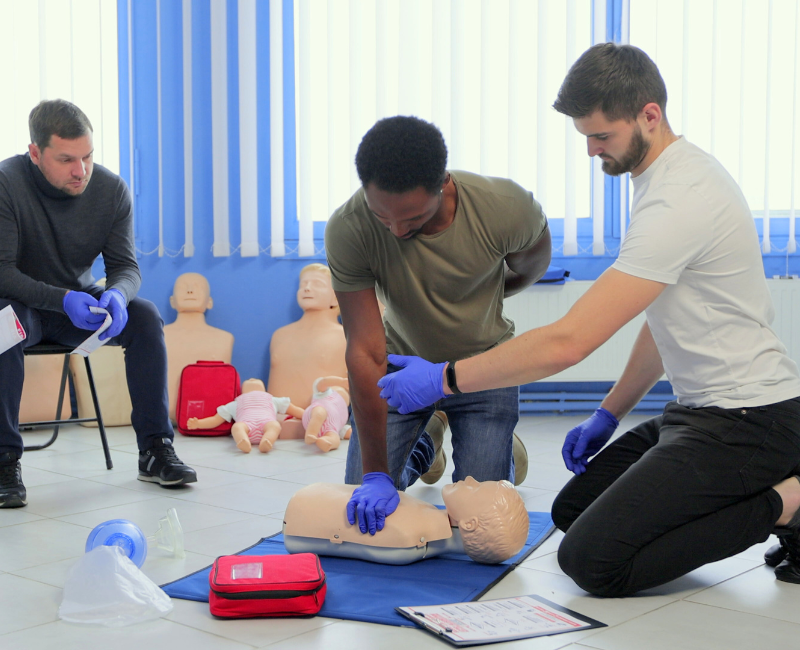
Training Programs in Maine
Frontiers Wellness Services: Building Skills for Safer, More Supportive Communities
Practical Training for Everyday and High-Stress Situations.
Frontiers Wellness Services offers hands-on training for individuals and organizations seeking practical, trauma-informed approaches to care, communication, and crisis response. Our courses are practical, approachable, and rooted in real-world experience.
Participants build useful skills they can apply right away, like calming tense situations, supporting people through crisis, and understanding how trauma affects behavior. Each course is designed to help people feel more prepared, more grounded, and better able to support others and themselves whether in healthcare, education, community services, or at home.
Training Courses
-
This training program is designed to equip employees with the skills needed to effectively manage interactions with agitated consumers. The focus is on creating a safer environment by teaching techniques to diffuse tension and prevent conflicts from escalating. Participants learn to recognize signs of agitation, communicate effectively and empathetically, and implement strategies for crisis intervention. The program also emphasizes the importance of following safety protocols and includes role-playing exercises to enhance real-world application. Overall, it aims to build employee confidence in handling challenging situations while promoting a positive workplace atmosphere.
-
This training program is designed to equip professionals with foundational knowledge about the effects of trauma on individuals. It focuses on fostering awareness and sensitivity in interactions, promoting a supportive and understanding environment. The training aims to enhance participants' skills in creating safe spaces that encourage healing and empowerment for those who have experienced trauma. By emphasizing a compassionate approach, the training prepares participants to better meet the needs of individuals affected by trauma in various settings.
-
This course focuses on applying core principles of trauma-informed care in real-world settings. Participants learn how to create environments that prioritize safety, trustworthiness, and collaboration, ensuring that individuals feel respected and empowered. The training emphasizes practical strategies for integrating these principles into everyday interactions and organizational policies. By fostering an understanding of how trauma influences behavior and experiences, the training equips professionals to support healing and resilience effectively.
-
Enhancing healthcare professionals' understanding of trauma and its effects, this training emphasizes the importance of integrating trauma-informed approaches into patient care while also addressing the well-being of the providers themselves. Participants learn strategies to manage stress and prevent burnout, fostering a supportive work environment that promotes resilience. This holistic approach ultimately aims to improve both patient outcomes and the overall health of healthcare providers.
-
"Substance Use Disorder 101" training offers foundational knowledge about the nature, impact, and treatment of substance use disorders. Participants learn about the prevalence of these disorders, their effects on individuals and communities, and the importance of early intervention. The training emphasizes the need for empathy and understanding, equipping attendees with the skills to recognize signs of substance use issues and to support those affected. Additionally, it highlights resources and strategies for promoting recovery and resilience. The overall goal is to foster awareness and create a supportive environment for individuals struggling with substance use.
-
Mental Health First Aid training equips participants with the skills to recognize and respond to mental health crises. It focuses on understanding mental health challenges, improving communication, and fostering supportive environments. Participants learn how to provide initial support and guidance, empowering them to assist individuals in need effectively. The training emphasizes empathy, active listening, and the importance of reducing stigma surrounding mental health issues. Through interactive activities and discussions, attendees gain confidence in their ability to help others while also caring for their own mental well-being.
-
This course focuses on equipping professionals with an understanding of harm reduction principles and practices. Participants learn to adopt a compassionate, non-judgmental approach to support individuals dealing with mental health and substance use challenges. The training emphasizes creating safe environments, empowering clients, and promoting well-being while recognizing that complete abstinence may not be the immediate goal for everyone. Through practical scenarios and discussions, attendees develop skills to implement harm reduction strategies effectively in their work settings.
-
"Stress First Aid" training focuses on equipping individuals with the skills to recognize and respond to stress in themselves and others. Participants learn about the impact of stress on mental health and well-being, as well as effective techniques for support and intervention. The training emphasizes creating a supportive environment, promoting resilience, and fostering open communication. By simulating real-life scenarios, attendees gain practical experience in applying their knowledge, ultimately enhancing their ability to assist others in managing stress effectively.
-
Gain awareness and understanding of the complexities surrounding suicidal thoughts and behaviors. This training involves developing skills for recognizing warning signs, fostering empathy, and promoting supportive communication. Participants learn to create safe environments for individuals in distress and to connect them with appropriate resources and support systems. The training emphasizes the importance of collaboration and community involvement in effectively addressing this critical issue.
-
This program equips participants with essential skills to respond effectively in emergencies. Through engaging videos, lectures, and hands-on practice, attendees will learn to recognize heart attack and stroke signs, perform CPR, and handle environmental emergencies. The program fosters a strong sense of responsibility and community awareness, preparing attendees to make a positive impact in emergency situations.
Strengthen Your Ability to Respond with Confidence and Compassion
Our goal is to equip professionals and caregivers with the skills, knowledge, and confidence to respond effectively in a range of challenging situations. Whether you're looking to deepen your understanding of trauma-informed care, strengthen crisis intervention techniques, or build a solid foundation in mental health and safety practices, our trainings are designed to meet you where you are.
Join us to enhance your first aid and emergency response skills and take the next step in creating safer, more responsive environments for those you serve. By the end, participants will feel confident and prepared to assist those in need during critical situations.

